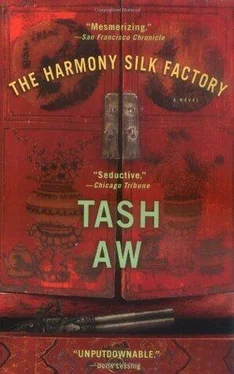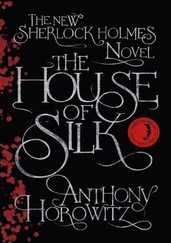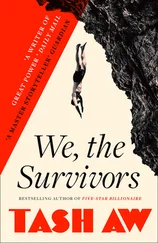I fell heavily into a dreamless sleep, and when I awoke there was no one around. The tarpaulins had been dismantled and packed bags lay piled on top of one another like the bodies of small dead animals. I walked calmly over to Snow’s things and searched for her journal. I found it — a simple clothbound notebook filled with neat handwriting on unlined paper. I took it and placed it in my satchel.
The tide was at its lowest when we carried our things through the trees across the wide, flat beach. The sea had retreated a long way into the distance, leaving the boat marooned on an expanse of grey sand. We splashed through the shallow streaks of warm brine as we ferried the remnants of our camp to the boat, and then we sat on the deck waiting for the tide to come in and bear us away. The sky was deepening with rain clouds and the air was very still.
I FELL ILL almost as soon as I arrived back in Kampar. I collapsed on my bed and locked the door, leaving strict instructions not to be disturbed. My room smelled of mothballs and cat piss; I sank heavily into a fever, my bedclothes damp and peeling from my bare skin like old bandages every time I moved. And then came the shivers, the awful gripping shivers that made me whimper silently into the wet sheets. I could not escape this punishment, so I closed my eyes and surrendered to it. I let my insides be burnt by the fever and cut by the cold until I began to find relief in this cycle. Fever sweats shivers fever sweats shivers. Several times Johnny came to the door, imploring me to emerge. His frenzied voice cajoled and begged and raged, but I remained in my fetid den. I was safer there; torture had become my companion and I did not wish for anything more. When, several days (weeks? who knows?) later my condition “improved,” and the tremors no longer wracked my body, I sat on my bed and found myself alone in a bare, airless room. The thin hiss of the wireless was the only noise I heard. The Prince of Wales, it announced, had been sunk. Together with its mighty companion the Repulse, the HMS Unsinkable had been destroyed by Japanese kamikaze planes in the South China Sea off the coast of Kuantan. Pearl Harbor, I learnt, had already been attacked. Hong Kong and the islands of the Philippines had fallen; Siam would soon follow. Landings had been made in the north of the country, in Kota Baru, and soon they would be upon us in the Valley. I rose unsteadily to my feet and made for the door.
The journey to the Soong house was an arduous one. The glare of the sunlight was too much for my etiolated constitution and instantly my head began to swim. My legs felt shaky, and I stumbled repeatedly on the smallest pebbles. I marched on, my shirtsleeves hanging dismally from my torso; in the warm Valley afternoon I became aware that my body had become reed-thin and worn. My shoes chafed at my toes and I felt blisters begin to form. I walked through the plantation and into the yard of the Soong house. A group of men, neatly dressed in clean, smart clothes, stood leaning against a car smoking cigarettes. All shared Kunichika’s sharp, hawkish features, his muscular stance. I passed without addressing them and proceeded up the stairs, heading straight for the front door. When I reached the verandah at the top of the steps, Kunichika emerged from the house, his brow knotted tightly in a frown. He paused when he saw me, his face relaxing into a smile. He looked at me with languidly narrowed eyes, and then, wordlessly, descended the stairs and joined his cigarette-smoking coterie.
The house was dark and cool as I stepped inside. I passed through the anteroom into the large sitting room. T. K. Soong sat at the piano, his fingers moving lithely over the keyboard. He played a Chopin nocturne, gently and easily, without any hesitation or restraint.
“I thought you didn’t play the piano,” I said.
He did not turn around. “A little. We all have our secrets.”
I stood motionless, listening to him play. He remained looking into the shiny black face of the upright.
“Your daughter,” I said. “May I see her?”
“Snow is,” he said, over the sad, playful notes, “not here.”
I stayed for a while, listening to him finish the nocturne and proceed seamlessly into the next one. And then I left the house. I walked down the steps and crossed the dusty yard into the plantation. The rubber trees on either side of the path stood unmoving in the windless afternoon. I passed into their shade and looked up; not a single leaf quivered. Where there was a gap in the trees sunlight fell in deep bright pools, bathing me luminous white. I walked like this, through shadows and light, until I reached the main road back to the rest house.
“There you are!” a voice called as a car juddered to a halt next to me. It was Gerald and Una Madoc, the couple I had met at the party. “We heard you were back, but no one knew where you were,” Gerald said, out of breath as if recently returned from a long walk.
“I’ve been — I haven’t been well, you see.”
“Well, you could have told one of us, what with all this going on.”
“I’m sorry,” I said. “I didn’t know there was such a fuss about things.”
“Such a fuss?” he said. “Good God, man, haven’t you heard what’s happening?”
“Yes,” I said, “yes, I have.”
“Come on,” Una cried, her face flushed and agitated by the heat, “just get in the car. We have to be quick.”
“Good boy,” Madoc said as I climbed in. “We’re rounding up the stragglers and taking everyone down to Kuala Lumpur. The plan’s to get to Singapore. There’ll be boats back to Blighty. We’ll stop to get your things. Don’t take everything — just the essentials. Be quick.”
I knew exactly what to take, and soon we were speeding away from the rest house. In town the shops were closed, their painted concertina doors drawn firmly shut. A few people walked briskly in the street, and a lorry was being loaded with sacks of rice, but otherwise the main street was quiet. On the outskirts we found ourselves caught behind a herd of cattle. They milled indolently in the road, ignoring the harsh barks of the cowherd. We fell into a slow crawl behind them, Madoc furiously gesticulating at the skinny half-naked boy who flailed pathetically at the cows with his rattan whip.
“I couldn’t believe it,” Una said quietly, “I just couldn’t believe it. The Prince of Wales, my God. Could you?”
“No,” I said, clutching my satchel to my belly.
The road began to widen, curving towards the river, and the cattle broke into a lazy trot.
“A lot of us were hit hard when we heard the news,” Madoc said. “We couldn’t believe the Japs could do that to us. One of the chaps was at the naval base in Singapore when the Prince of Wales docked, and he said it was unsinkable.”
A small row of whitewashed houses appeared before us, sheltered by a colossal banyan tree; I remembered that I had been here before, with Johnny. I remembered that we sat on the riverbank and talked about how he would make this his new home. He talked about where he would position his bed — facing the window, looking out onto the wide sweep of the river, so that Snow would be able to rise to this view every morning. His eyes shone when I suggested filling the courtyard with earthenware pots decorated with dragons, with lilies and goldfish. He laughed when I asked him about children. “When I have a son,” he said, “he will inherit this place. He will inherit the home that I built. No, that you built.” And then he threw back his head and chirruped with laughter.
Johnny was standing in front of this house as the car crept past. The sight of him did not surprise me, for in truth I was expecting him. Boxes were piled high at the entrance, and all the doors and windows lay open. Johnny stood shirtless in conversation with a few labourers. He shielded his eyes from the sun as he spoke.
Читать дальше
Конец ознакомительного отрывка
Купить книгу












